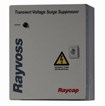Rayvoss Surge Protection System Reduces Equipment Downtime And Maintenance

 Liberty Lake, WA - Raycap Inc., a leader in transient voltage surge suppression technology, has developed a rugged, stand-alone surge protection system that protects the entire facility from all sources of transient overvoltage, reducing the downtime and maintenance of expensive and revenue generating electronic equipment. Designated Rayvoss, the robust system integrates Strikesorb SPD modules into a heavy-duty enclosure and meets the demanding requirements of the IEC 61643-1 and UL 1449 2nd Edition safety standards without resorting to internal fuses or thermal disconnection mechanism. In addition, the Rayvoss system has successfully passed independent 3-cycle testing up to 100,000 symetrical RMS Amperes.
Liberty Lake, WA - Raycap Inc., a leader in transient voltage surge suppression technology, has developed a rugged, stand-alone surge protection system that protects the entire facility from all sources of transient overvoltage, reducing the downtime and maintenance of expensive and revenue generating electronic equipment. Designated Rayvoss, the robust system integrates Strikesorb SPD modules into a heavy-duty enclosure and meets the demanding requirements of the IEC 61643-1 and UL 1449 2nd Edition safety standards without resorting to internal fuses or thermal disconnection mechanism. In addition, the Rayvoss system has successfully passed independent 3-cycle testing up to 100,000 symetrical RMS Amperes.
"The innovative Rayvoss systems are the safest SPDs available on the market today and can be configured to meet any electrical installation," said Jeff Gibbons, VP Sales and Marketing at Raycap. "Rayvoss systems protect sensitive electronic equipment from damage causing transient surges that are injected on AC power feeds regardless of their source. Transient threats generated by lightning activity, utility switching operations, power factor correction, and from other electrical loads are eliminated by the Strikesorb surge suppression modules utilized by the Rayvoss surge suppression system."
Available in single-phase, split-phase, three-phase wye and three-phase delta configurations, Rayvoss systems can be installed directly to the internal bus bars eliminating the voltage drop across a fuse. This also provides lower clamping voltages, elimination of voltage surge when a fuse opens, lower maintenance and no parts to replace. Operating voltages include 120, 240, 120/208Y, 240/415Y, 277/480Y, 347/600Y, 240D and 480D.
Rayvoss systems provide complete protection from lightning, temporary overvoltage and other transient voltage activity in a wide range of applications including cellular network radio base stations, microwave radio relay stations, telecommunication central offices, street cabinets housing telecommunication equipment, wireless rural telephony networks, CATV networks, industrial and automation controls, hospitals, defense installations, airports, data centers, semiconductor plants, variable speed drives and a host of other applications requiring continuous 24/7 operation because safety is critical.
SOURCE: Raycap Inc.
